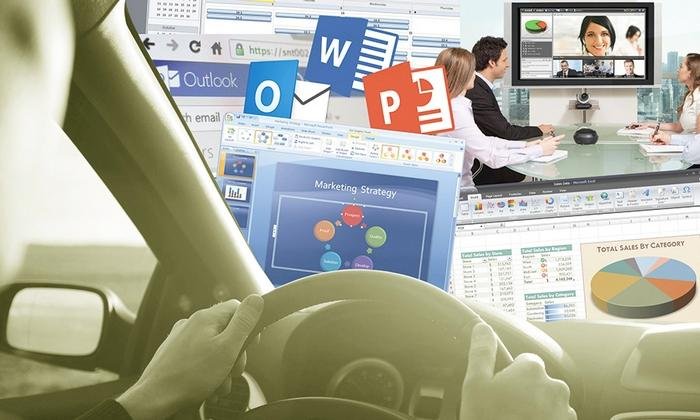Challenge For Microsoft: Could We Get More Work Done In Our Cars? (Should We?)

People tired of checking corporate email around the clock may prefer it that way. After all, a request from the boss can still be reasonably deflected with a simple: "Sorry, I'm driving."
Yet for Microsoft Corp., which dominates the workplace software market with its Office 365 suite, in-car productivity is a huge, untapped opportunity. Many people use cars as mobile offices, and as cars become more automated, putting together a slide deck behind the wheel may go from unsafe to commonplace.
In January, the software giant disclosed a partnership with supplier Harman to bring Microsoft Office staples such as teleconferencing, calendars and email into the car. Microsoft told Automotive News the first production car with Office 365 productivity tools should hit the market by year end.
"Today, even with all the connectivity that exists, it's challenging to join a conference call in the car," Sanjay Ravi, a worldwide managing director who oversees Microsoft's automotive business, said in an interview. "What if you could jump into the car and let the rest be taken care of by your car? To me, that's super exciting."
Ravi said customers could sign into Office 365 through the car instead of through a smartphone, with over-the-air updates keeping the service fresh. It's a way to ensure drivers aren't stuck with the automotive equivalent of Windows 95.
The plan would bring Microsoft closer to the vision that founder Bill Gates laid out in 2007, when he took the stage at the Consumer Electronics Show in Las Vegas to introduce Ford's Microsoft-based Sync infotainment system. Drivers, he proclaimed, want to "do the same things in the car that they can everywhere else."
Yet the move into productivity tools also represents a stark change in course for Microsoft, which pushed for a decade to sell embedded operating systems for cars -- besides Ford, customers included Fiat, Nissan and Kia.
Microsoft's main focus now is the Azure cloud computing service, which Ford and Nissan use to gather and analyze data generated by their cars. Ravi said Microsoft has stressed that it sees automakers as customers and not rivals -- a jab at fellow technology giants Apple and Google.
"We aren't in the business of manufacturing vehicles and competing with automotive brands," Ravi said, adding: "That's why you're seeing automotive companies starting to engage with us in a deep way across a spectrum of areas."
By building Office 365 into the car, Microsoft similarly hopes to strengthen its product as automakers strengthen theirs. This makes sense particularly as a long-term play for self-driving cars, said Mark Boyadjis, a senior analyst at IHS Automotive.
"Until we have full autonomy, I can't see Microsoft Excel or PowerPoint or document creation technology being added to the car," he said. "Right now it's about staying connected. It's not necessarily about working in the car."
Yet some executives might be prepared to pay for productivity tools built into the back seat of a chauffeured car. Car-sharing is another opportunity; business travelers might pay extra for an Uber with built-in cameras for a back-seat videoconference.
Boyadjis sees potential in the plan to help people manage email, calendars and teleconferencing more safely. He confessed that he sometimes catches himself balancing his smartphone on his knee in traffic to get into a teleconference.
"Sometimes I say to myself: "What the hell am I doing, Mark?'" Boyadjis said. "It's dangerous. It's just as bad as texting."
The idea of enabling drivers to use PowerPoint or Excel during a commute raises broader questions about the proper balance between work and personal time.
That's where knowing the customer will be crucial, said Manuela Papadopol, a former automotive marketing manager at Microsoft who now works at the Continental AG software division Elektrobit.
Productivity tools may make sense for an executive sedan, she said, but not a sports car.
"Some people will want to be productive in the car, and others won't," Papadopol said. "But if you're a salesman or a person who goes from one meeting to another during the day, you probably want to use that time more efficiently in a safe way."
Related News
